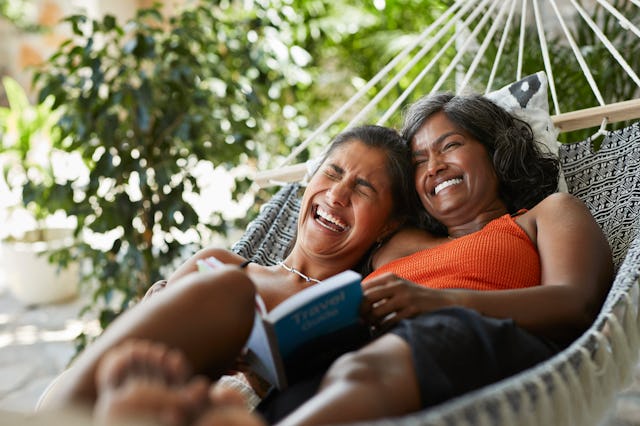Can You Be Friends With Your Adult Kid? Should You Be?
Navigating the parent-child friendship waters is tricky. A psychologist is here to help.

You don't need us to tell you that each stage of parenthood brings with it challenges and rewards of all kinds. But having an adult kid is unique, and there's a good chance your grown-up baby has different needs than they did when they were younger and relied on you for everything.
That parent-child bond is a special one, as you've fostered it and watched it grow over the span of decades. If you're lucky, your adult child wants you around, values your insight, and treasures their time with you. But does that mean you're their friend? Is it even possible to be friends with your own kid? And, if so, should you be?
Here to help you navigate these tricky parenting waters is Michele Goldman, psychologist and Hope for Depression Research Foundation media advisor, and she's sharing how to know if your bond is a healthy, happy one — or if it's got some red flags.
Generally speaking, Goldman notes, "Healthy relationships are not one-size-fits-all. There is fluidity and flexibility within the spectrum of what is healthy. Healthy relationships usually include honesty, communication, trust, and respect."
Goldman notes that as your child grows from their late teens into their 20s, it's "natural that the relationship will also develop." There are even more changes when your kid hits their 30s and 40s, as they're able to see you not only as a parent but as an individual, too.
Even with all these natural shifts, you both have to want that type of relationship, she says. "Remember, you are not friends with everyone you meet. It is possible that you would not naturally be friends with your own child. That's entirely OK. However, if you both want to be friends, you can begin to move towards a more equal relationship where there is no longer the power dynamic that existed when they were younger that was necessary for safety and security."
Boundaries 101
Perhaps the most important (and challenging) part of a parent-child friendship is establishing boundaries, which Goldman says "will vary from family to family, and even relationship to relationship."
Even if you're super close-knit with your adult kid, you will not want to use them as your free therapist, meddle in their life in a way that makes them uncomfortable, or judge them for your choices, and it's on you as the parent to uphold those boundaries.
"Determine the difference between what is private and what is not," says Goldman. "Understand when there is a need for distance (emotional or literal physical distance). As parents, we tend to do a lot of talking. We talk to our children; we teach them; we instill values in them; we share stories. As your child moves into adulthood, you may notice yourself listening more than you're talking. There's less a need to 'fix it' and more a need to listen and support."
She adds, "Sometimes it is necessary to have a transparent conversation about boundaries." For example, if you did their laundry during college and want them to do it now that they've graduated, Goldman suggests a "kind yet firm" discussion. This holds true for other boundaries, such as lending money or paying bills, respecting time or living space, or topics of conversation, such as romantic relationships or health concerns.
Red Flags
How do you know if your friendship is a healthy one? If you start feeling resentful of your child, feel your time is not your own (and is instead dictated by them), or suspect they are taking advantage of you, Goldman says these are all signs something's not right in the current dynamic.
"People-pleasing is an example of one type of unhealthy relational dynamic," she adds. "It's nerve-wracking to say 'no' to people." The fear of being disliked or rejected causes some to "acquiesce and do the compliant thing. However, this can lead to regular boundary violations and disrespect within the relationship."
Parents can cross boundaries with their adult kids, too. (Cue Taylor Swift: "It's me, hi, I'm the problem, it's me.”) Some telltale signs you're not respecting their autonomy include:
- Giving unsolicited advice.
- Overstepping or protecting them from harm, which Goldman says "keeps them from learning and developing on their own," adding, "Adult children might be tempted to fall back into the child role of needing to be taken care of."
- Falling into old patterns, which might make your kid feel infantilized. "Managing conflict is possible but needs to be done between two adults, not between an adult and the perceived young child (that no longer exists)," says Goldman.
Green Flags
It's not all bad, though. There are so many rewarding parts of having a genuine friendship with someone you've known their entire life. "Having ongoing, supportive relationships with someone who knows you fondly, where there is love in the relationship, allows for a feeling of safety and security," says Goldman. "You both already know each other's likes and dislikes; it allows you to be more intimate because of the familiarity that already exists."
Also, a newly-formed friendship "allows the parent to be a part of their adult child's life in a new way — you can learn about their romantic partners, to get a view on how the child will parent if they are choosing to be a parent," and the like.
Staying curious and compassionate (while kicking judgment, shame, or stigma to the curb) makes a strong foundation for any friendship, and you can count yourself a lucky one if you've got that with your grown-ass kid, whether they're 21, 31, 41, or beyond.